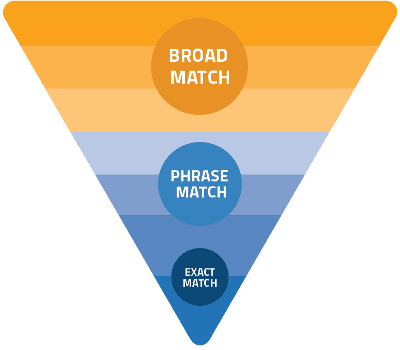For text ads on Google, everything revolves around keywords. Keywords are what link a customer’s search to relevant ads created in Google Ads. If keywords qualify Ads to be shown for searches on Google, match types allow us to fine tune just how closely aligned searches and keywords need to be in order to show your ad.
There are 3 different match types that may be assigned to a keyword. These determine how broad or narrow a user’s search will need to be in order to match the keyword.

The broader the match type, the greater the reach. However as reach increases, relevancy can become diluted as ads may show for less relevant searches.
Whether your aim is create large broad campaigns that generate many impressions, or to create narrow, focused campaigns that drive highly specific relevant traffic, striking a good balance of match types for the maturity stage of your campaign is key. Here’s how each match type can affect your strategy.
Broad Match Type
Broad match is the default setting for any new keyword, so understanding it is important. Broad match reaches the widest possible audience. Whenever a user queries any word in your key phrase, in any order, your ad may show. So for example, if you are advertising golf shoes and your broad match term is “golf shoes”, your ad may be displayed if a user types “golf shoes”. But it may also display for “golf tournaments”, and “ballet shoes”. Neither of which you would want to be paying good for. This is where negative keywords become very important. You can read about negative keywords in our post “Negative keywords – the most neglected optimisation technique in adwords?”.
Phrase Match Types
Phrase matches gives a great level of control over broad matches. By using a phrase match your ad will only appear when a user searches for your keywords in the exact order that you specify. The phrase may appear anywhere within the user’s search but must be in the exact word order you have specified.
For example, for the phrase “golf shoes” your ad could be shown for any of the following searches;
- golf shoes for men
- cheap golf shoes
- white golf shoes
- golf shoes on ebay
So here relevancy is increased, but the volume of traffic will decrease. As phrase relies on keywords being in order the above term wouldn’t qualify for searches such as “shoes for golf” or “golfing shoes”
Exact Match Type
The most specific match type is Exact. For exact match type keywords, your ad will only be displayed when a searcher types your exact key phrase in by itself, no prepending or trailing terms. This gives the greatest level of relevancy, but will significantly reduce the number of searches that your ad qualifies to show for.
So, for example, for the exact match term “golf shoes” your ad will only be shown for the search golf shoes. It will not show for cheap golf shoes, golfing shoes, or golf shoes sale.
Getting the balance of match types right
All three match types are important and powerful tools in your PPC campaigns. Every campaign is different and the best mix of match types will be different accordingly.
To get the most out your pay-per-click activity you need to understand when and how often to use each of these. Keeping on top of the mix through optimisation and testing is a crucial ongoing task. As campaigns mature the balance between research, expansion, budget assignment and strategy will impact on the best match types to use.
If you’ve managed to get your head around keyword match types, you need to try competitor bidding. To help get you started, we’ve written an article on how to best bid on your competitors’ brand keywords. Better still, why not get in touch and we can walk you through it.








